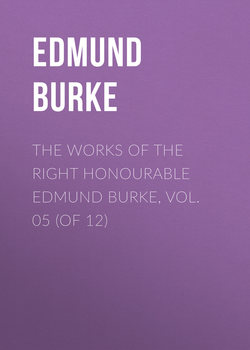Читать книгу The Works of the Right Honourable Edmund Burke, Vol. 05 (of 12) - Edmund Burke - Страница 1
OBSERVATIONS ON THE CONDUCT OF THE MINORITY PARTICULARLY IN THE LAST SESSION OF PARLIAMENT. ADDRESSED TO THE DUKE OF PORTLAND AND LORD FITZWILLIAM. 1793
ОглавлениеLETTER TO HIS GRACE THE DUKE OF PORTLAND
My dear Lord,—The paper which I take the liberty of sending to your Grace was, for the greater part, written during the last session. A few days after the prorogation some few observations were added. I was, however, resolved to let it lie by me for a considerable time, that, on viewing the matter at a proper distance, and when the sharpness of recent impressions had been worn off, I might be better able to form a just estimate of the value of my first opinions.
I have just now read it over very coolly and deliberately. My latest judgment owns my first sentiments and reasonings, in their full force, with regard both to persons and things.
During a period of four years, the state of the world, except for some few and short intervals, has filled me with a good deal of serious inquietude. I considered a general war against Jacobins and Jacobinism as the only possible chance of saving Europe (and England as included in Europe) from a truly frightful revolution. For this I have been censured, as receiving through weakness, or spreading through fraud and artifice, a false alarm. Whatever others may think of the matter, that alarm, in my mind, is by no means quieted. The state of affairs abroad is not so much mended as to make me, for one, full of confidence. At home, I see no abatement whatsoever in the zeal of the partisans of Jacobinism towards their cause, nor any cessation in their efforts to do mischief. What is doing by Lord Lauderdale on the first scene of Lord George Gordon's actions, and in his spirit, is not calculated to remove my apprehensions. They pursue their first object with as much eagerness as ever, but with more dexterity. Under the plausible name of peace, by which they delude or are deluded, they would deliver us unarmed and defenceless to the confederation of Jacobins, whose centre is indeed in France, but whose rays proceed in every direction throughout the world. I understand that Mr. Coke, of Norfolk, has been lately very busy in spreading a disaffection to this war (which we carry on for our being) in the country in which his property gives him so great an influence. It is truly alarming to see so large a part of the aristocratic interest engaged in the cause of the new species of democracy, which is openly attacking or secretly undermining the system of property by which mankind has hitherto been governed. But we are not to delude ourselves. No man can be connected with a party which professes publicly to admire or may be justly suspected of secretly abetting this French Revolution, who must not be drawn into its vortex, and become the instrument of its designs.
What I have written is in the manner of apology. I have given it that form, as being the most respectful; but I do not stand in need of any apology for my principles, my sentiments, or my conduct. I wish the paper I lay before your Grace to be considered as my most deliberate, solemn, and even testamentary protest against the proceedings and doctrines which have hitherto produced so much mischief in the world, and which will infallibly produce more, and possibly greater. It is my protest against the delusion by which some have been taught to look upon this Jacobin contest at home as an ordinary party squabble about place or patronage, and to regard this Jacobin war abroad as a common war about trade or territorial boundaries, or about a political balance of power among rival or jealous states. Above all, it is my protest against that mistake or perversion of sentiment by which they who agree with us in our principles may on collateral considerations be regarded as enemies, and those who, in this perilous crisis of all human affairs, differ from us fundamentally and practically, as our best friends. Thus persons of great importance may be made to turn the whole of their influence to the destruction of their principles.
I now make it my humble request to your Grace, that you will not give any sort of answer to the paper I send, or to this letter, except barely to let me know that you have received them. I even wish that at present you may not read the paper which I transmit: lock it up in the drawer of your library-table; and when a day of compulsory reflection comes, then be pleased to turn to it. Then remember that your Grace had a true friend, who had, comparatively with men of your description, a very small interest in opposing the modern system of morality and policy, but who, under every discouragement, was faithful to public duty and to private friendship. I shall then probably be dead. I am sure I do not wish to live to see such things. But whilst I do live, I shall pursue the same course, although my merits should be taken for unpardonable faults, and as such avenged, not only on myself, but on my posterity.
Adieu, my dear Lord; and do me the justice to believe me ever, with most sincere respect, veneration, and affectionate attachment,
Your Grace's most faithful friend,
And most obedient humble servant,
EDMUND BURKE.
BEACONSFIELD, Sept. 29, 1793.
